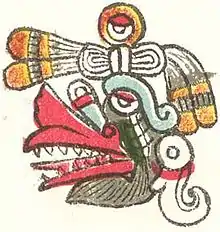ehecatl
See also: ehēcatl
Central Nahuatl
Etymology
From Classical Nahuatl ehecatl.
Pronunciation
- IPA(key): /eʔˈeːkatɬ/
References
- Mancilla Sepúlveda, Héctor (2002); Lecciones de Náhuatl, (Amecameca variant), Editorial Hirata; Mexico City, Mexico.
- Aguilar Carrera, Sergio (2012); Método práctico de lengua náhuatl del Altiplano Mexicano; Amecameca variant, Dirección de Casa de Cultura de Tecámac, State of Mexico, Mexico. ISBN 03-2012-030812540200-01.
Classical Nahuatl

The glyph for the day sign “wind”, from the Codex Magliabechiano.
Alternative forms
- eecatl (obsolete spelling)
Etymology
A frequentative reduplication of ehcatl (“wind”).
Pronunciation
- IPA(key): [eʔˈeː.kat͡ɬ]
Noun
ehēcatl (inanimate)
- air
- 1555, Alonso de Molina, Aqui comienca vn vocabulario en la lengua castellana y mexicana, f. 12v.
- Ayre. ehecatl.
- Air. ehecatl.
- Ayre. ehecatl.
- 1571, Idem, Vocabulario en lengua castellana y mexicana y mexicana y castellana, f. 7r. col. 1.
- Ayre. ehecatl.
- Air. ehecatl.
- Ayre. ehecatl.
- Idem, f. 28r. col. 2.
- Eecatl. viento, o ayre.
- Eecatl. wind, or the air.
- Eecatl. viento, o ayre.
- 1555, Alonso de Molina, Aqui comienca vn vocabulario en la lengua castellana y mexicana, f. 12v.
- wind
- 1571, Alonso de Molina, Vocabulario en lengua castellana y mexicana y mexicana y castellana, f. 28r. col. 2.
- Eecatl. viento, o ayre.
- Eecatl. wind, or the air.
- Eecatl. viento, o ayre.
- 1571, Alonso de Molina, Vocabulario en lengua castellana y mexicana y mexicana y castellana, f. 28r. col. 2.
- The second day sign of the Aztec tonalpohualli.
- 16C, Codex Magliabechiano, f. 11v.
- Macuili ecatl / ques çinco vien / tos.
- Macuili ecatl. [sic] which means “five winds”.
- Macuili ecatl / ques çinco vien / tos.
- 16C, Codex Magliabechiano, f. 11v.
Derived terms
Terms derived from ehecatl
- āmīlpampa ehēcatl
- ceehēcatl
- cihuātlāmpa ehēcatl
- ehēcaxoctli
- ehēcayoh
- huēyi ehēcatl
- huitztlāmpa ehēcatl
- ihcoyoca ehēcatl
- ītztic ehēcatl
- pitzāhuac ehēcatl
- piyāciuhtoc ehēcatl
- tepēehēcatl
- tetecuica ehēcatl
- tlālhuācpan ehēcatl
- tlāpcopa ehēcatl
- tlāuhcopa ehēcatl
- tōnalehēcatl
- tōnatiuh īaquiyampa ehēcatl
- tōtoca ehēcatl
- xitetecuica ehēcatl
- xōpan ehēcatl
Proper nouns derived from ehecatl
- Ehecatepec
- Ehecatzinco
Descendants
References
- Alonso de Molina (1571) Vocabulario en lengua castellana y mexicana y mexicana y castellana, Editorial Porrúa, pages 7r, 28r, 117v
- Lockhart, James (2001) Nahuatl as Written: Lessons in Older Written Nahuatl, with Copious Examples and Texts, Stanford: Stanford University Press, page 217
- Andrews, J. Richard (2003) Workbook for Introduction to Classical Nahuatl, rev. ed. edition, Norman: University of Oklahoma Press, page 254
This article is issued from Wiktionary. The text is licensed under Creative Commons - Attribution - Sharealike. Additional terms may apply for the media files.